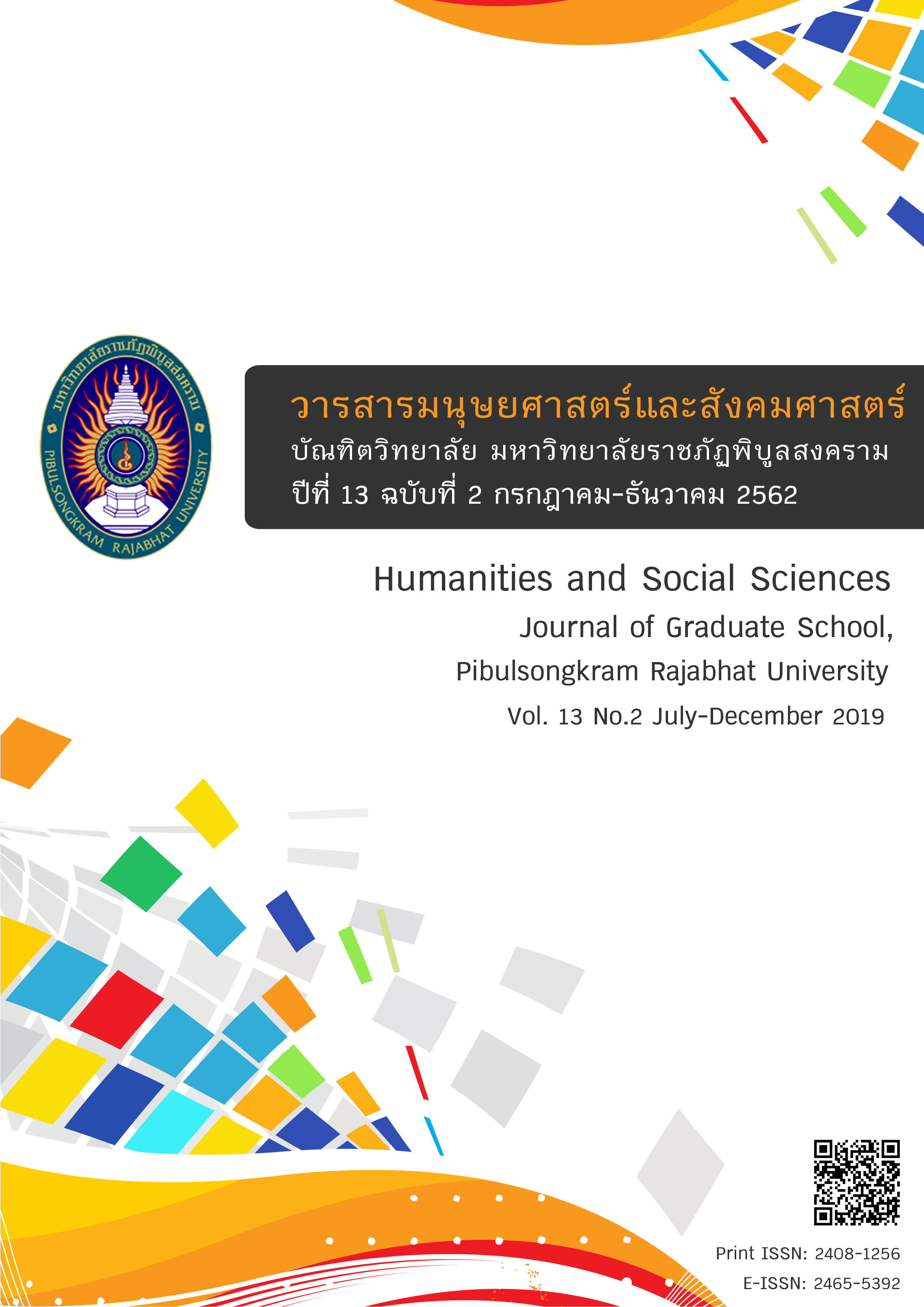The Integration of Sufficiency Economy Philosophy and 21st Century Learning Applied by Students Majoring in Public Administration Science, Pibulsongkram Rajabhat University for Aiming toward Sustainable Development
Keywords:
Sufficiency Economy Philosophy, Integration, 21st Century Learning, Sustainable DevelopmentAbstract
This research aims to study the integration of Sufficiency Economy Philosophy and 21st century learning to be in use as well as to compare these two concepts in order for giving suggestions to students majoring in public administration science, Pibulsongkram Rajabhat University in aiming toward sustainable development. The sample group is a group of 400 public administration science students. The data is framed by Taro Yamane’s ready-to-use table and collected by the distribution of questionnaires, then statistically analyzed for finding mean, S.D., T-test, and One-way ANOVA. According to the pair test by using LSD method, research result demonstrates that: 1. The integration of Sufficiency Economy Philosophy and 21st century learning in 5 aspects show the most level of overall picture. If considering each aspect, the aspect that contains the most vale of “mean” is conditions of knowledge, next is having enough knowledge, having knowledge immunity, conditions of morality, and reasonability, chronologically. 2. The comparison between Sufficiency Economy Philosophy and 21st century learning can be categorized by personal characteristics and it is found that different ages and incomes of students majoring in public administration science, Pibulsongkram Rajabhat University has resulted in different opinions concerning concepts of Sufficiency Economy Philosophy and 21st century learning. In contrast, it shows no difference with statistically importance of 0.05 among different genders, education levels, and years of study. 3. Suggestions for aiming toward sustainable development by having the integration of Sufficiency Economy Philosophy and 21st century learning state that students express their opinions regarding this matter that it is very challenging for them especially with this kind of rapid change in every aspect nowadays such as economics, societies, politics, as well as religions and cultures. More importantly, this century is the time with innovations of knowledge and rapid growth, as a result; students must acquire knowledge, and have such access ability. Moreover, they should be more selective, adaptive, and communicative including bringing knowledge concerning Sufficiency Economy Philosophy to apply to be used for their daily life professions effectively for the creation of sustainable development.
References
จรัส สุวรรณมาลา. (2558). ปาฐกถาในหัวข้อ “Education Influencing Future”. ใน การประชุมวิชาการ The 4th PSU Education Conference. สงขลา: ศูนย์ประชุมนานาชาติฉลองสิริราชสมบัติครบ 60 ปี.
วลัยพรรณ จันทร์หอม. (2553). การนำหลักปรัชญาเศรษฐกิจพอเพียงมาใช้ในการดำเนินชีวิตของครูโรงเรียนกาญจนานุเคราะห์ จังหวัดกาญจนบุรี (วิทยานิพนธ์รัฐประศาสนศาสตรมหาบัณฑิต), มหาวิทยาลัยราชภัฏสวนสุนันทา, กรุงเทพฯ.
วาสิฏฐ์ มณีโชติ. (2552). การนำหลักปรัชญาเศรษฐกิจพอเพียงมาประยุกต์ใช้ในการดำเนินชีวิตของนายทหาร
ชั้นประทวน สังกัดกองพันทหารช่างที่ 9 (วิทยานิพนธ์รัฐประศาสนศาสตรมหาบัณฑิต), มหาวิทยาลัยราชภัฏสวนสุนันทา, กรุงเทพฯ.
สำนักงานคณะกรรมการพัฒนาเศรษฐกิจและสังคมแห่งชาติ คณะอนุกรรมการขับเคลื่อนเศรษฐกิจพอเพียง. (2550). นานาคำถามเกี่ยวกับปรัชญาเศรษฐกิจพอเพียง. สืบค้น 25 มกราคม 2561 จาก, https://www.nesdb.go.th/sufficiency.
สํานักงานคณะกรรมการพัฒนาการเศรษฐกิจและสังคมแห่งชาติ. (2560). แผนพัฒนาเศรษฐกิจและสังคมแห่งชาติ ฉบับที่ 12 (พ.ศ. 2560-2564). กรุงเทพฯ: สํานักนายกรัฐมนตรี.
Best. (1978). Developmentally Appropriate Curriculum: Best practices in early childhood education. (4th ed.). New Jersey: Prentice Hall.
Cronbach, L. J. (1990). Essentail of Psychological Testing. New York: McGraw-Hill.
Downloads
Published
How to Cite
Issue
Section
License
Any articles or comments appearing in the Journal of Humanities and Social Sciences, Rajabhat Phibulsongkram University, are the intellectual property of the authors, and do not necessarily reflect the views of the editorial board. Published articles are copyrighted by the Journal of Humanities and Social Sciences, Rajabhat Phibulsongkram University.









